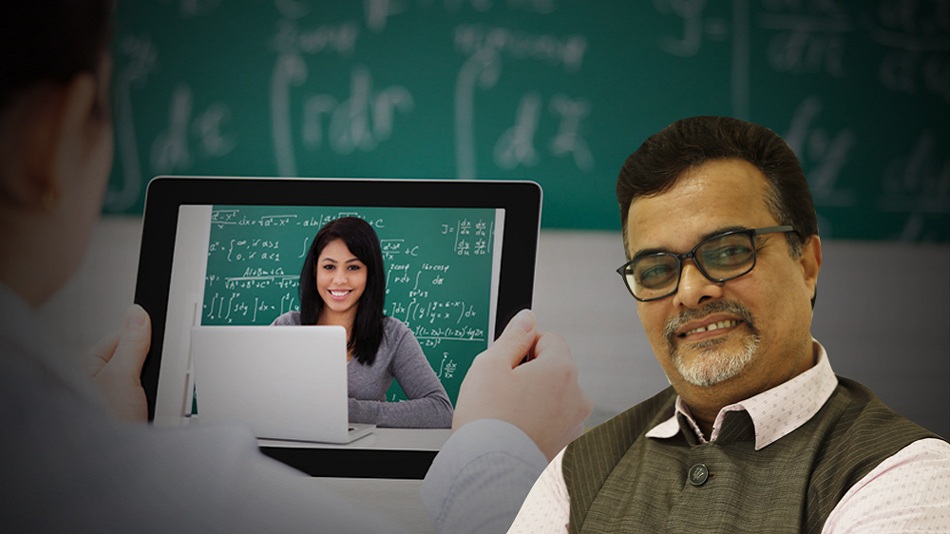Many young friends on our campuses, who are quite tech-savvy and are a social media aficionado, often lamented in the past that most others were not and at times even mocked that their teachers are 'dinosaur like' in the world of technology.
COVID-19 and protracted lock-down for weeks and possibly months now are creating an equalizer: all need to be up on the digital bandwagon. Youths and not so young, alike.
We are moving to a completely new world of blended learning even post COVID-19 as there will be no return to the old normal in most aspects of life. New Normal will impact the teaching-learning process in a big way, as in many other areas of life too.
For starters, teachers will be called mentors now as information and knowledge are at the fingertips of the students faster than that of the teachers, especially the grown-up learners, post 16 years let's say. It was so earlier, but even the facade of higher knowledge (read, degrees, age and experience) is not of great value moving ahead. So mentors shall be needed to inspire, motivate, direct to a new domain of learning or action, bring in perspectives, be an agony aunt/uncle, lend shoulder to a grieving youth, but not much for knowledge and information which are anyways available.
Similarly, students will be learners. Oh, they were always so. But, the onus of learning is all the more on the learner now on (in the earlier regime teachers teach, students study). Students study for exams, marks and degrees, under the tutelage of teachers, with a structured syllabus. Learners learn within and beyond the classroom, from mentors and others, for lifetime use of knowledge for a career and life, within and beyond the syllabus, structured or unstructured, online or offline.
Next, the digital was the add-on, also-ran in education till now, and a bit more important at the university level. But it will turn to be an equal, or more, partner now. From senior classes in schools to university. It will be also-ran even in junior classes of schools. Operating through whatsapp group chats, using FB wall and Twitter as message board, Instagram as chronicler of activities through visuals, using Google Class at times, putting self study resources (ppts, pdfs, links, cases, pictures) online in shared google drives, conducting educational delivery through Learning Management Systems online, debates/discussions online through secure chatbox, using FB Live, or Zoom for audio-visual live interaction, et al, will be the new normal in education.

This means each learner, specially the more privileged ones need to have a smart-phone with secure net connectivity, a laptop and a good wifi connection. The digital divide will deprive the digital have-nots as is now the case, and the rulers have to come with plans of free tablets to the youths and easier inexpensive secure net connectivity too. The nation is already reeling under the economic divide, digital divide cannot be added to that as digital access is now almost a human right.
Engagement is the new currency in the post COVID-19 education, as much as in entertainment. For a long time, the grievance in the classroom was that students are not present and neither interested to learn. That challenge is universal. But digital allows the learner to be engaged at his time, place and pace. And that is good enough. A digital learner will seek proactively content that engages him/her and will react suitably. Hence, the onus will be on the mentors for producing engaging content, making such content across other platforms (like Khan Academy, Coursera, Swayam, etc) available to the learners, and creating opportunities for the learners to be creatively and voluntarily engaged.
It is a qualitatively different world ahead. Good and bad education will not be decided by marks and numbers of degree certificates handed. It will be decided by the level of academic and related online and social media engagement of the learners, the quality of content shared by mentors, and the value and volume of content generated by engaged learners.
Still conferences will happen, but then webinars will be no less. Still classroom sessions will happen, more for clarification and meeting external experts and guests. Still examinations will happen, but a good part will be online, open book tests, applied and contextualized questions. Still syllabus will be there, but it will evolve organically and there will be scope of learning within and beyond the syllabus. Still mentors will be needed, but more to clarify doubts, correct mistakes, lead to content already there digitally available, and at times to motivate in their learners' low moments.
The focus will be projects, assignments, products and designs developed, and marks, grades et al will be the by-products of the process. Journey should and will be more important the destination.
Unique experiences will emerge. A historical location will be learnt through portals, observations of earlier visitors noted online, video links along with a brief classroom session and a much longer interactive discussion on it within the class and online. A scientific principle will be learnt digitally, visualized online, discussed in content shared ahead of the class, doubts clarified in class, further experimented in the labs, and debated online. Flipped classroom will require mentors to share their content ahead of the session with sessions being an interactive critical appreciation or doubt clearing time. Peer learning will be visible far more than ever in the past even in schools.
Exciting times ahead. And hence, education will truly not be the amount of information that is pushed into the memory cells running a riot there as is usually the case, but true man-making, character-building, life-evolving skills needed to curve out a place under the sun for each learner, socially and economically, contributing to the collective good.
Let us reinvent ourselves. Corona virus has literally asked the world and mankind to reboot and restart the journey of our lives. It will be to our peril and disservice if we do not make version 2.0 of ourselves, as mentors and learners, which are actually interchangeable roles lifelong.
Bon Voyage.
The writer is Pro Vice Chancellor, Adamas University, Kolkata. He was the former Dean, School of Media, Pearl Academy, Delhi & Mumbai, former Dean of Amity University, Mumbai, former Director of Symbiosis Institute of Media & Communication & Dean, SIU, Pune. He was also the former Dean, Whistling Woods School of Communication, Mumbai and former Media Adviser, Textiles Ministry, GOI; The Nippon Foundation & WHO, India.

